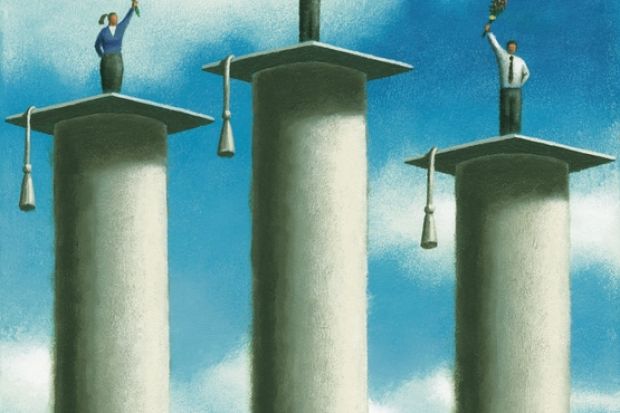“Education made America great; neglect of education can reverse the process.”
These were the words of Nobel prize-winning economist Paul Krugman in his New York Times column on 8 October.
On the same day, Times Higher Education published the results of its annual Times Higher Education-QS World University Rankings, which showed a decline in the standing of US institutions and the rise of Asian powers in the higher education sphere.
An international debate on the changing geography of higher education began.
On the Atlantic Wire website, the headline for its world rankings coverage spoke volumes: “America Slips in Rankings of World Universities, Fretting Abounds”.
Columnist Benjamin F. Carson writes that although rankings can be “tendentious and annoying”, they are also “irresistible conversational fodder”.
“Because it fits into the narrative of American decline, the Times Higher Education rankings have attracted particular criticism,” he says. “Some Americans argue that the list’s preference for international students rigs it for Asian schools, while others assert that the low ranking of academic titans such as the University of California, Berkeley is self-evidently absurd.”
But he adds: “Whatever the metrics, it’s clearly hitting a nerve with those who worry that vaunted US universities, long the prize of the educational system, are losing their edge.”
US website Inside Higher Ed spoke to Robert M. Berdahl, president of the Association of American Universities. He said: “We don’t generally place a great deal of stock in the public rankings of universities, but we don’t ignore them either.
“They are important to the extent that they shape public perceptions of the qualitative hierarchy of institutions, but they all have flaws and biases.”
However, he added that the issue of the erosion of US dominance raised by Times Higher Education was “an important one”.
“The United States has to be concerned about this. We know that other nations are investing substantial amounts in building research universities, while the US has been disinvesting,” he said.
“If we cease to be the nation of choice for the best and brightest international students, or even the best American students, we will quickly cease to have the universities that are the choice for the best faculty and we will be caught in a downward spiral.”
In the Christian Science Monitor newspaper, its deputy international editor, Amelia Newcomb, writes that the US “better look over its shoulder – both East and West”.
“No matter what they say, colleges are watching. Higher education is big business and a source of national bragging rights. Rankings boost endowments. But not everyone buys them, whatever their source,” she says.
The US Chronicle of Higher Education warned that “while the merit of various popular rankings is a subject of debate, the latest list is certain to add fuel to concerns in the United States that the long-time dominance of American universities in higher education is eroding”.
But at Yale University, some reacted with admirable sangfroid to the news that their university had been pushed into third place by the University of Cambridge.
Yale Daily News reported: “But Yale is still ahead of Princeton, and that’s all that matters: the Tigers landed the eighth-place spot.”
There was a similar mood of reflection in Canada.
In a statement on Times Higher Education’s rankings, Gary Goodyear, Minister of State (Science and Technology) at the Federal Economic Development Agency for Southern Ontario, welcomed the news that Canada has 11 universities in the top 200.
He said that the Government was “making strategic investments in university research and strengthening the ability of Canadian universities to develop, attract and retain the world’s top talent”.
But in Canada’s Globe and Mail newspaper, Heather Munroe-Blum, principal of McGill University, warned that Canada must make further investments if it hopes to “play in the area of world-class scholarship”.
“We view our successes as precarious,” she said. “This is a fragile situation. We need to stay the course.”
Indira Samarasekera, president of the University of Alberta, told the newspaper that the rankings were “a sign of the global changes that are taking place in higher education”.
The rise of South Korean institutions, she said, had come from “very strategic investments”.
Earlier this year, the heads of five leading Canadian universities – including Dr Munroe-Blum and Dr Samarasekera – called for higher education reforms, including a greater concentration of research and graduate studies on key campuses.
“Being visionary means taking risks, making choices and choosing to think big and make bold investments,” Dr Samarasekera told the Globe and Mail.
Register to continue
Why register?
- Registration is free and only takes a moment
- Once registered, you can read 3 articles a month
- Sign up for our newsletter
Subscribe
Or subscribe for unlimited access to:
- Unlimited access to news, views, insights & reviews
- Digital editions
- Digital access to THE’s university and college rankings analysis
Already registered or a current subscriber? Login
